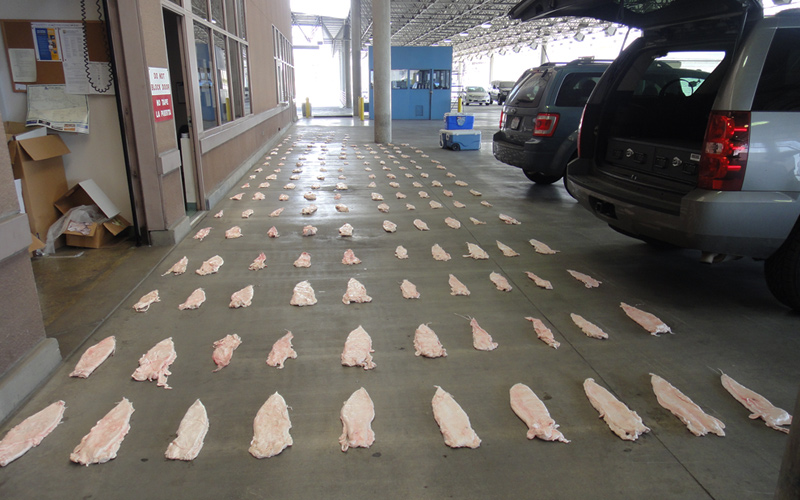Southern California man pleads guilty in fish bladder smuggling case
SAN DIEGO — A Southern California man has pleaded guilty to smuggling highly-prized swim bladders belonging to the endangered Totoaba fish into the United States, following a probe by U.S. Immigration and Customs Enforcement's (ICE) Homeland Security Investigations (HSI) and the U.S. Fish and Wildlife Service.
Anthony Sanchez Bueno, 34, of Imperial, Calif., admitted in federal court Wednesday that he attempted to smuggle 170 Totoaba swim bladders weighing more than 200 pounds into the U.S. through the Calexico port of entry. As part of the plea agreement, Sanchez Bueno acknowledged he intentionally hid the swim bladders under layers of fresh fish in coolers to avoid detection by U.S. Customs and Border Protection (CBP) officers, and that he intended to deliver the contraband to an Asian man at the Jack in the Box in Calexico.
Sentencing for Sanchez Bueno is scheduled for Sept. 6 before U.S. District Judge Cathy Ann Bencivengo. The charges carry a maximum sentence of up to 20 years in prison and/or a $250,000 criminal fine.
According to the plea agreement, Sanchez Bueno also acknowledged he had previously smuggled Totoaba swim bladders using coolers during February and March. U.S. authorities estimate the total value of the swim bladders Sanchez Bueno smuggled during the two-month period was more than $400,000.
HSI and FWS investigators began their probe into this unusual wildlife smuggling activity after an officer with CBP uncovered the first load of the endangered fish swim bladders during a vehicle inspection in February at the Calexico port of entry. The bladders were discovered under layers of non-regulated fresh fish inside a cooler.
Totoaba, which live exclusively in Mexico's Sea of Cortez, have been listed as an endangered species under the U.S. Endangered Species Act since 1979. Because the species is federally-protected in both the U.S. and Mexico, it is illegal to take, possess, transport or sell Totoaba. The fish, which can measure up to seven feet long and weigh more than 200 pounds, are known to live for up to 25 years.
The Totoaba bladders are an ingredient in a centuries-old Chinese soup recipe. After the bladder is removed and dried, they are sold on the black market in Hong Kong and mainland China where they fetch as much as $10,000 each.


